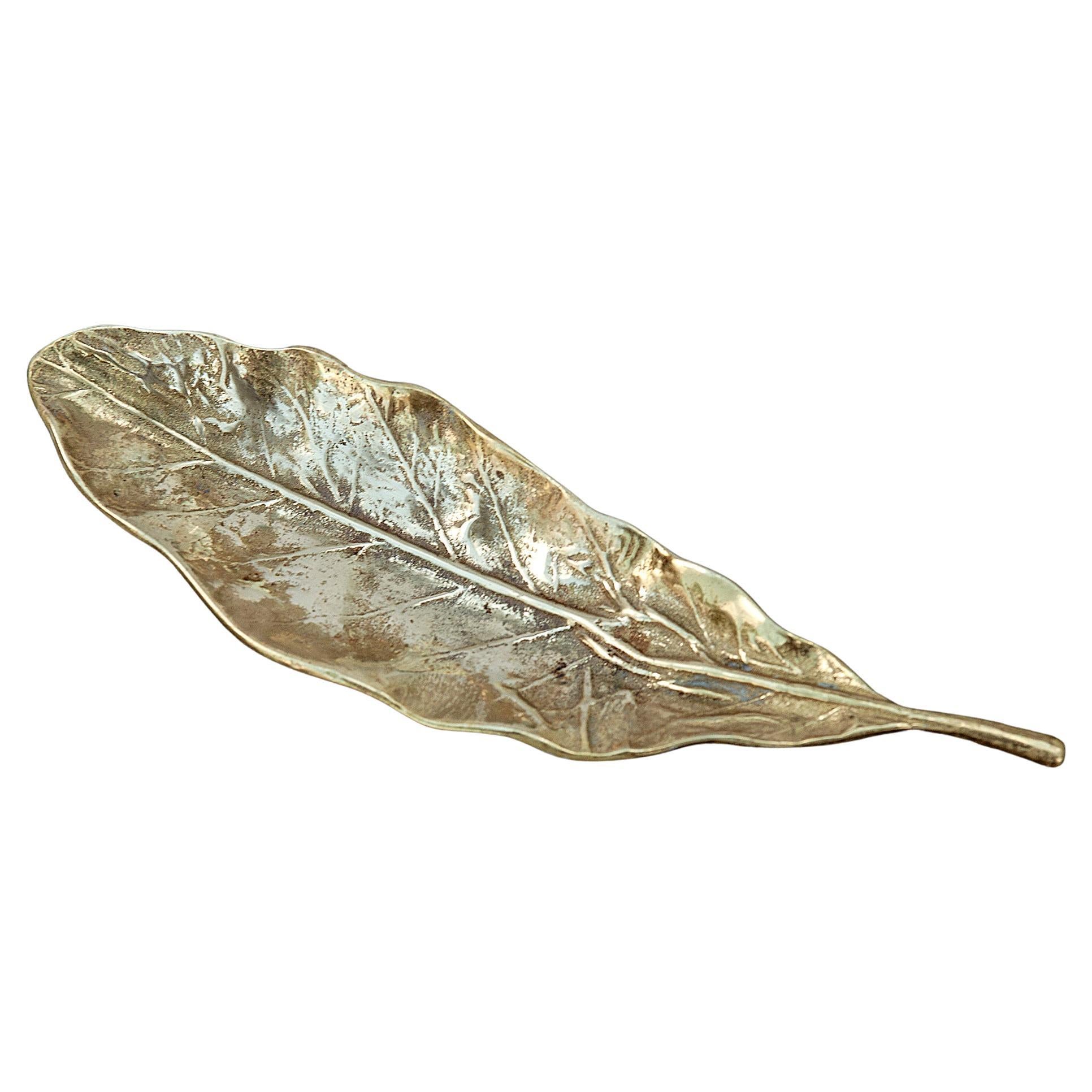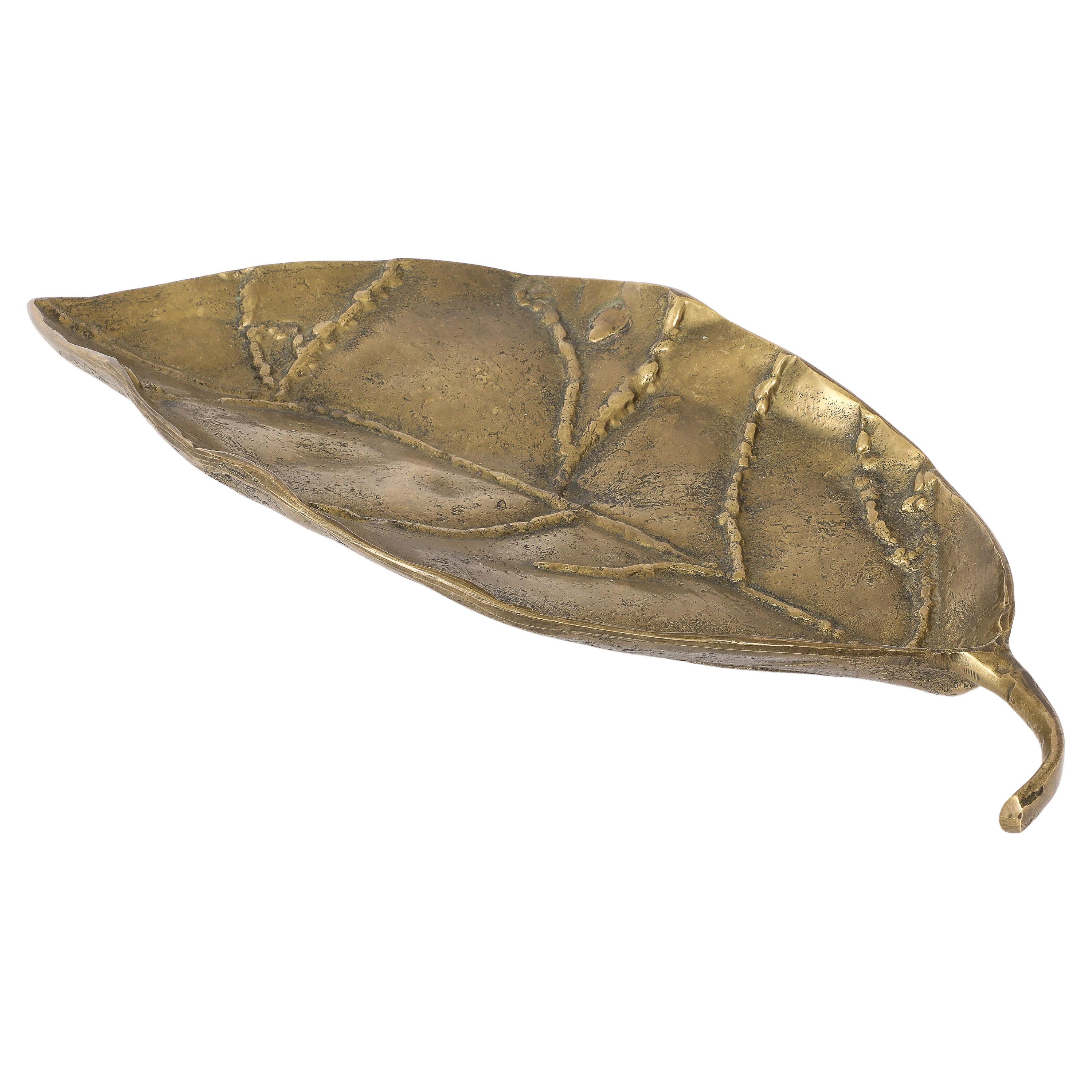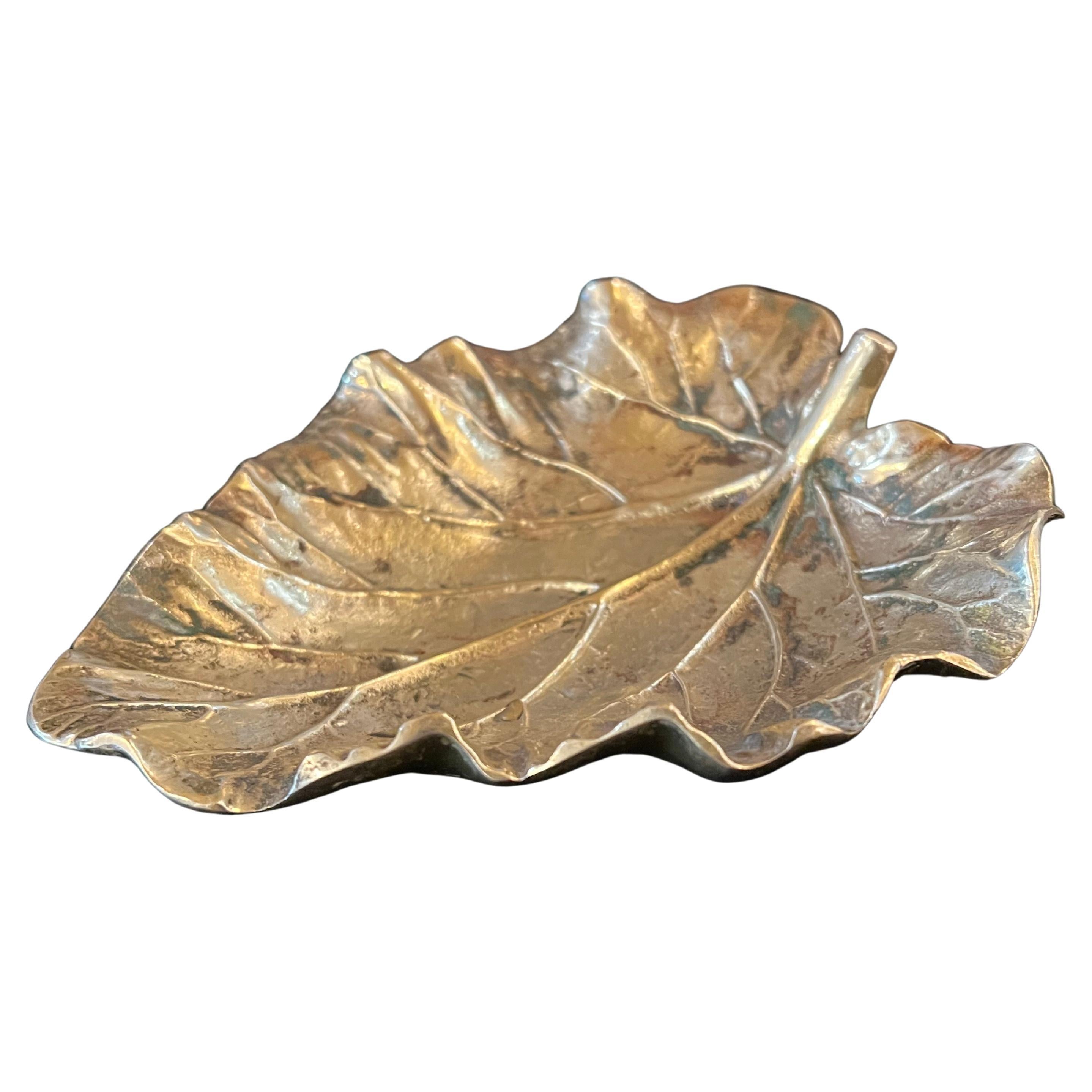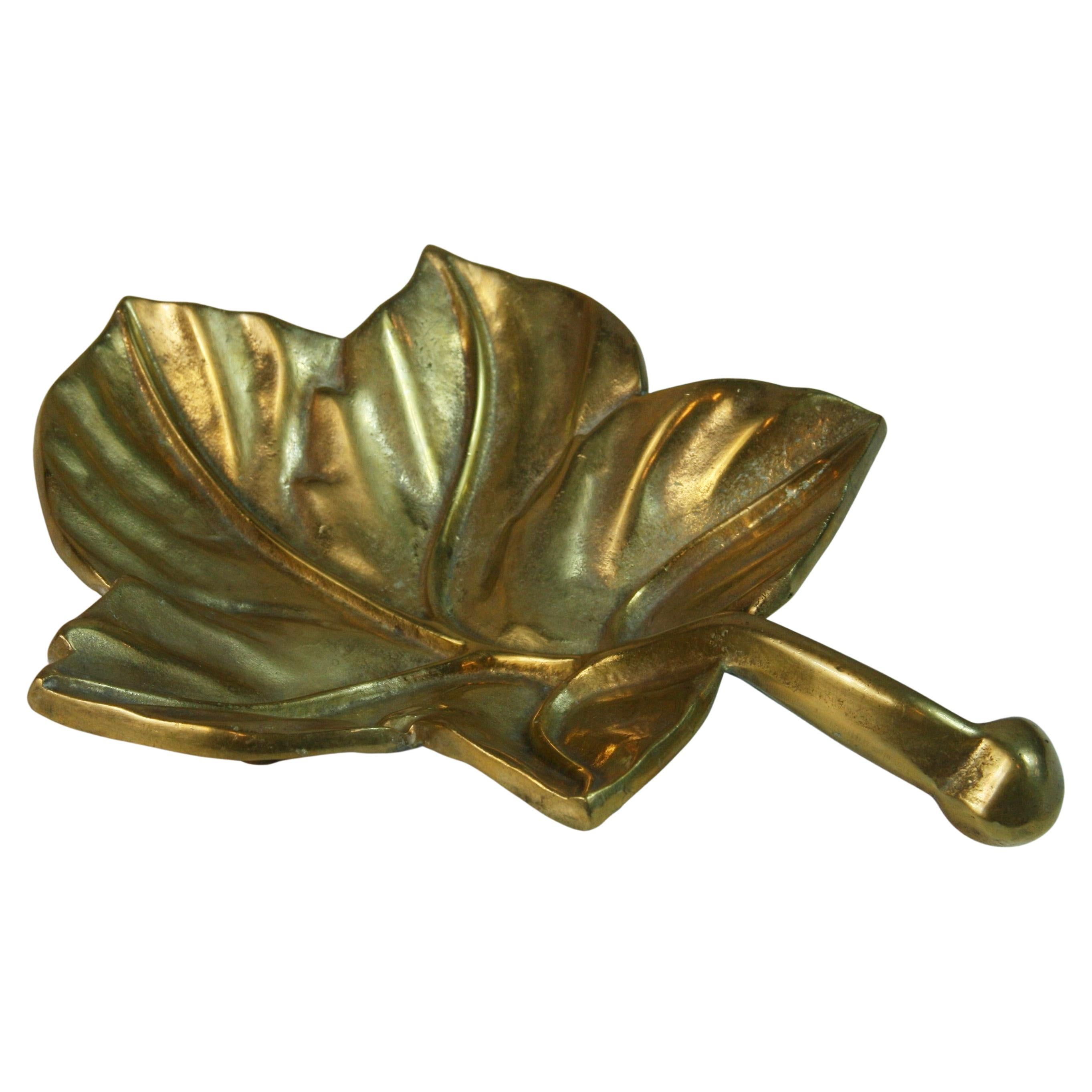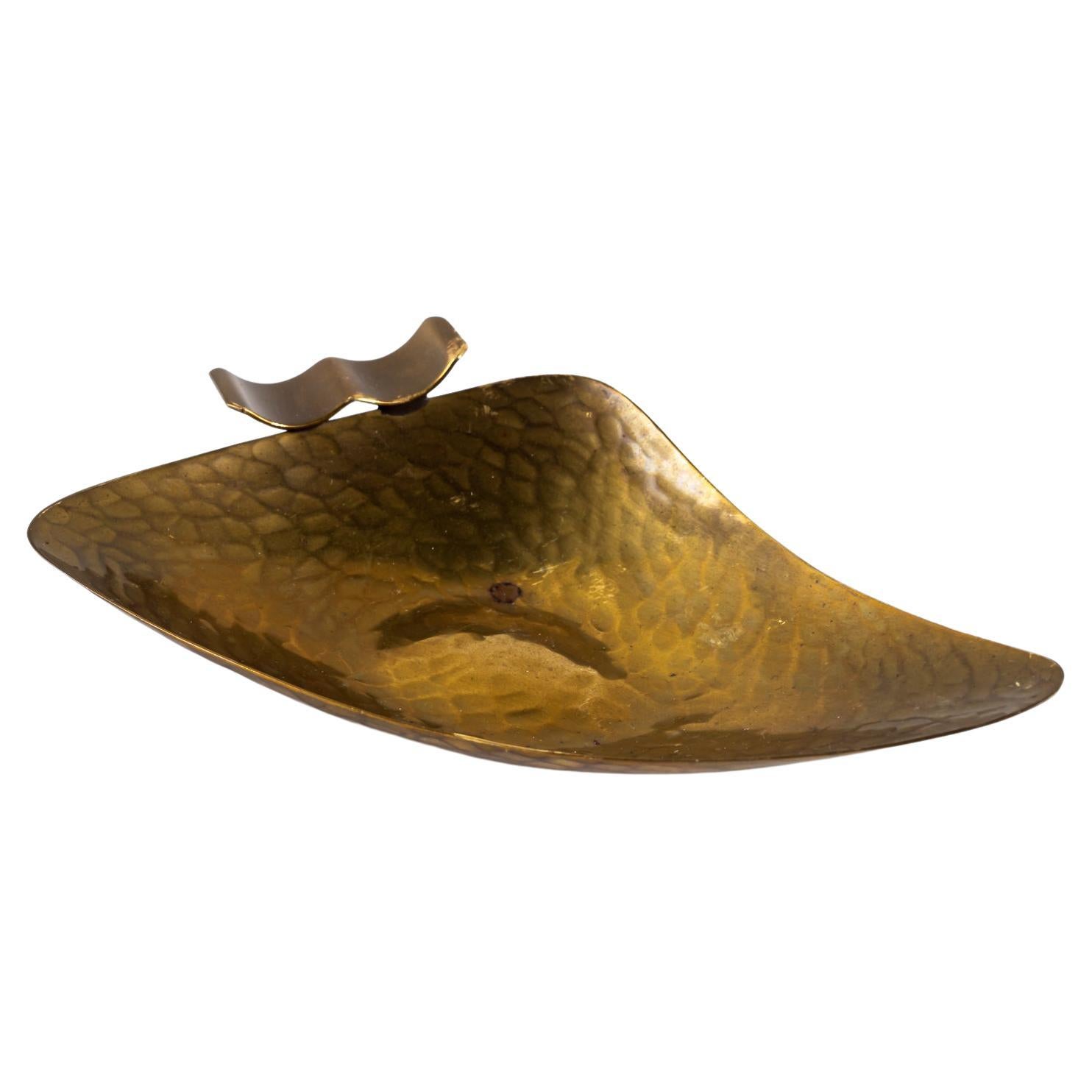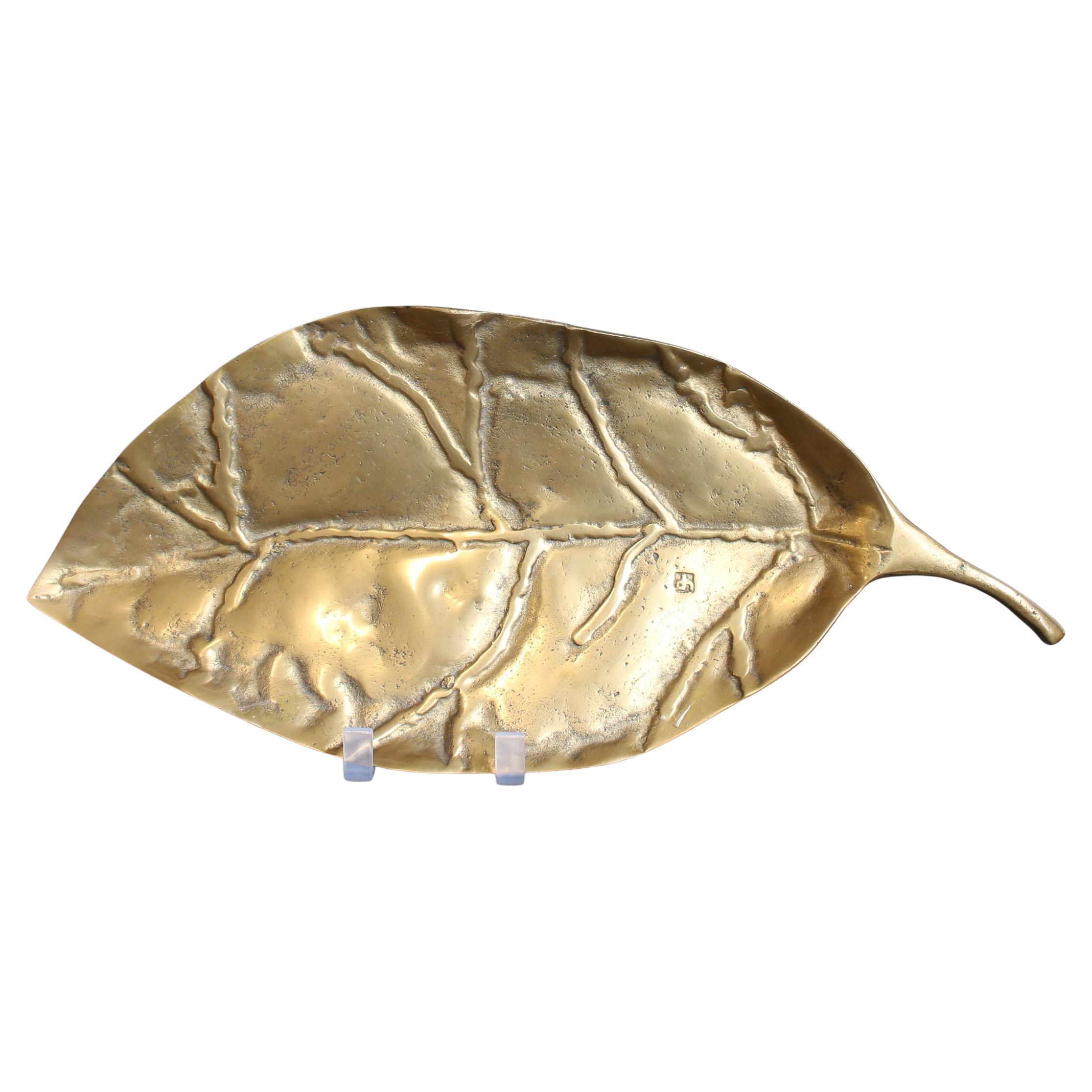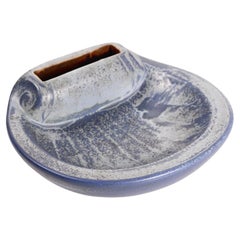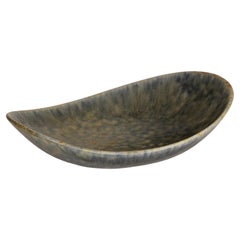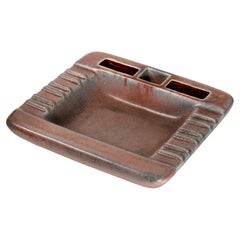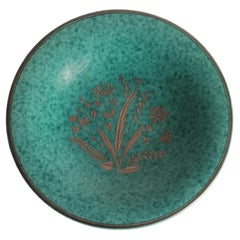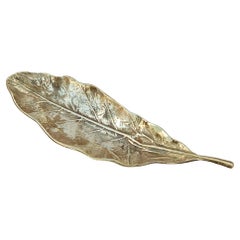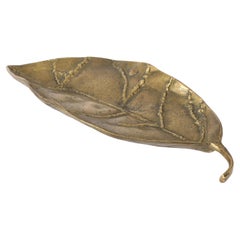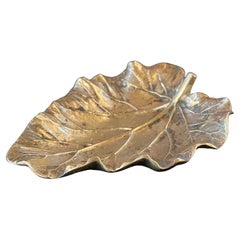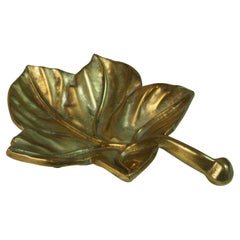Items Similar to Oskar J. W. Hansen Designed "Tobacco Leaf" Ashtray for Hauni Richmond INC
Want more images or videos?
Request additional images or videos from the seller
1 of 17
Oskar J. W. Hansen Designed "Tobacco Leaf" Ashtray for Hauni Richmond INC
$182.13
£134
€156.89
CA$255.12
A$279.95
CHF 144.95
MX$3,351.26
NOK 1,818.52
SEK 1,710.88
DKK 1,171.88
About the Item
Oskar J. W. Hansen (1892–1971) Designed "Tobacco Leaf" Ashtray for Hauni Richmond Inc.
An extraordinary example of functional art, this large ashtray was designed by renowned sculptor Oskar J. W. Hansen for Hauni Richmond Inc., a company known for its connections to the tobacco industry. Crafted with Hansen's distinctive eye for detail and form, the ashtray's tobacco leaf design pays homage to its intended purpose while serving as a sophisticated decorative piece.
Measuring 21.8 cm across, this ashtray is a substantial and striking object, ideal for collectors of mid-century design, sculptural works, or those with an interest in unique industrial pieces. Hansen, most famous for his monumental sculptures at the Hoover Dam, brings the same sense of grandeur and artistry to this smaller yet impactful work.
Oskar J. W. Hansen was a Norwegian-American sculptor celebrated for his monumental art, most notably his symbolic, Art Deco sculptures at the Hoover Dam, which represent the strength and resilience of the American people. His works often explored themes of unity, progress, and human achievement. His craftsmanship in this ashtray is no exception, showcasing his ability to infuse everyday objects with sculptural significance, making them both functional and artistic.
This is a rare opportunity to acquire a piece by a master sculptor in an unexpected context. Whether displayed as part of a collection or used functionally, this ashtray brings a sense of history and craftsmanship into any setting.
---
We invite you to follow us and look at our Storefront for further 20th Century Design pieces.
General note: Shipping quotes, as supplied by 1stdibs, are only indicative. Please contact us directly with your shipping requirements and we will source the most competitive shipment method (and rate) for every individual piece that is fully insured and professionally packed.
- Creator:Oskar Hansen (Sculptor),Virginia Metalcrafters (Maker)
- Dimensions:Height: 1.19 in (3 cm)Width: 8.59 in (21.8 cm)Depth: 2.56 in (6.5 cm)
- Materials and Techniques:Brass,Cast
- Place of Origin:
- Period:
- Date of Manufacture:1963
- Condition:Wear consistent with age and use.
- Seller Location:London, GB
- Reference Number:1stDibs: LU2868341743802
About the Seller
5.0
Gold Seller
Premium sellers maintaining a 4.3+ rating and 24-hour response times
Established in 2015
1stDibs seller since 2017
199 sales on 1stDibs
Typical response time: 1 hour
- ShippingRetrieving quote...Shipping from: Maldon, United Kingdom
- Return Policy
Authenticity Guarantee
In the unlikely event there’s an issue with an item’s authenticity, contact us within 1 year for a full refund. DetailsMoney-Back Guarantee
If your item is not as described, is damaged in transit, or does not arrive, contact us within 7 days for a full refund. Details24-Hour Cancellation
You have a 24-hour grace period in which to reconsider your purchase, with no questions asked.Vetted Professional Sellers
Our world-class sellers must adhere to strict standards for service and quality, maintaining the integrity of our listings.Price-Match Guarantee
If you find that a seller listed the same item for a lower price elsewhere, we’ll match it.Trusted Global Delivery
Our best-in-class carrier network provides specialized shipping options worldwide, including custom delivery.More From This Seller
View AllLarge Rörstrand Ashtray by Gunnar Nylund, 1950s Swedish Ceramic, Organic Form
By Rörstrand, Gunnar Nylund
Located in London, GB
Large Rörstrand Ashtray by Gunnar Nylund, 1950s Swedish Ceramic, Organic Form
A striking large ashtray, shell-like in its design, produced by the esteemed Swedish ceramic maker Rörs...
Category
Vintage 1950s Swedish Scandinavian Modern Ashtrays
Materials
Ceramic
Scandinavian Modern Swedish Bowl by Carl Harry Stalhane and Maker Rorstrand
By Carl-Harry Stålhane, Rörstrand
Located in London, GB
Swedish ceramic artist Carl-Harry Stålhane (1920- 1990) played a major role in popularizing Swedish pottery during the 20th century, working for more than three decades at Rörstrand, one of the oldest ceramics manufacturers in Europe. During his long tenure at Rörstrand, Stålhane was responsible for small-batch studio pieces, mass-produced tableware , and all manner of decorative accessories .
Born in 1920 in Mariestad, Sweden, Stålhane began working at Rörstrand in 1939 as a decorative painter, assisting Danish-Finnish ceramic artist, designer, and sculptor Gunnar Nylund (1904-1997). During this time, Stålhane decorated various ceramic pieces, most notably Nylund’s Flambé range (1939s), quickly establishing himself as a talented ceramic artist. Inspired by the desire for new products during the postwar economic boom, Stålhane went from being a talented decorator to an exceptional ceramic artist.
In 1943, Stålhane caught the eye of Swedish artist Isaac Grünewald (1889-1946), who was visiting Rörstrand. Grünewald was so impressed with Stålhane’s work that he took him on as a student, and from 1943 to 1946, Stålhane studied art at Grünewald's Art School in Stockholm. Subsequently from 1947 until 1948, he studied sculpture at Académie Colarossi in Paris.
During the 1950s, Stålhane’s work appeared in several solo exhibitions in Sweden, the United Kingdom, and the United States. His Blanca Tableware range (c. 1955) won numerous international prizes and was in high-demand. In 1958, Stålhane succeeded Nylund as Artistic Director and Chief Designer at Rörstrand.
In 1960, Stålhane unveiled a new collection at Stockholm’s Galerie Blanche. Featuring dark stoneware pieces made from local clays, this collection represented a bold departure from the soft, restrained shapes of the 1950s. It has since been praised for its precient aesthetic that would influence the look of ceramics for more than a decade.
From 1963 until 1971, Stålhane taught ceramics at the Art Industrial School in Gothenburg. For a short time, he also was the Design Director at the Swedish factory Upsala Ekeby, which in addition to porcelain, produced tile, brick, and glass.
Stålhane eventually left Rörstrand in 1973 in order to establish his own ceramic company, Designhuset, in Lidköping, where he further experimented with local clays and minerals. Stålhane continued to work until his death in 1990. Today, Designhuset is a school for ceramists and model-makers.
Over the course of his career, Stålhane created several public works for The Commerce Trust Company in Kansas City, Missouri, and for Volvo in Gothenburg, Sweden. His work is represented at several international museums, including Stockholm’s Nationalmuseum and New York’s MoMA.
Rörstrand is the second oldest brand of ceramics in Europe and can be found in homes all across Sweden and Europe. Rörstrand’s long legacy includes some of Europe’s most iconic ceramics collections including Swedish Grace, Mon Amie, Ostindia, Filippa...
Category
Vintage 1950s Swedish Scandinavian Modern Ceramics
Materials
Ceramic, Stoneware, Pottery
Large Rörstrand Ashtray Table by Gunnar Nylund, 1950s Swedish Ceramic, Signed
By Rörstrand, Gunnar Nylund
Located in London, GB
Large Rörstrand Ashtray Table by Gunnar Nylund, 1950s Swedish Ceramic, Signed
A large and distinctive ashtray table produced by Rörstrand, Sweden, in the 1950s. Designed by Gunnar N...
Category
Vintage 1950s Swedish Scandinavian Modern Ashtrays
Materials
Ceramic
Art Deco Gustavsberg Argenta Ceramic Plate with Silver Inlay by Wilhelm Kåge
By Wilhelm Kage, Gustavberg
Located in London, GB
This wonderful Art Deco plate or shallow bowl made in Sweden 1930s at Gustavsberg factory, was designed by the painter and ceramicist Wilhelm Kåge. The name Argenta comes from the La...
Category
Vintage 1930s Swedish Art Deco Pottery
Materials
Silver
Mid-Century Modern Daum Crystal Star Bowl
By Daum
Located in London, GB
This refined and sculptural translucent glass bowl was produced by Daum, one of the most illustrious glass makers of the period in Nancy, France, circa 1950. Daum was awarded a Grand...
Category
Mid-20th Century French Mid-Century Modern Glass
Materials
Glass
Mid Century Modern Ceramic Jardinière by Bernard Rooke
By Bernard Rooke
Located in London, GB
An organic and Brutalist style Jardine which would work perfectly with trailing foliage.
Bernard Rooke (born 1938) is a British artist and studio potter. Rooke has exhibited his "Brutalist" ceramics and painting both in the UK and abroad with work in many collections both public and private including the Victoria and Albert Museum, Cleveland Museum of Art, Nuffield Foundation, Röhsska Museum in Sweden and the Trondheim Kunstmuseum in Norway.
Bernard Rooke attended Ipswich School of Art studying painting and lithography before going on to study at Goldsmiths College of Art. It was while studying here that he decided to take up pottery. Although unfamiliar with this craft and tradition, he found that working with clay provided new opportunities for freedom of interpretation and creativity.
In 1960 Rooke set up his first pottery in Forest Hill in South London along with Alan Wallwork. It was a very small room with enough space for a small electric kiln. He was initially using mainly hand building, coiling, blocking and slabbing techniques. While researching ideas, he was supporting himself by part-time lecturing at London University, Goldsmiths College and St Mary's College. In addition, Rooke's membership of 'The Craftsman Potters' Association' enabled him to show his work in a shop in Carnaby Street in London.
In 1967, both the need for a larger working space and becoming disillusioned with living in London spurred Rooke into moving out of the city and to an old mill building in Swilland in Suffolk. Rooke wanted to widen the range of work so as to become more commercial. With the birth of his son, Aaron, and much needed work to be done on the mill, it was important to be able to make a living.
In 1968, the Grand Metropolitan Hotel commissioned Rooke to make 120 standard lamps, 120 table lamps as well as a 24 foot long ceramic mural and another 9 foot high, which incorporated interior lighting. The money from the commission helped to pay for much needed restoration work on the mill.
By the 1970s, a gallery space was opened in the windmill and run by Susan Rooke, Bernard's wife, selling work to locals and tourists as well as to American airmen based nearby. The vision for Mill Gallery was beginning to develop and alongside this a reputation was building bringing in a good source of income.
Sons Aaron and Felix were becoming more involved with the running of the pottery, giving Bernard more time to develop new ideas and designs and more time to continue with his painting. In 2004, the Rooke family decided not to sell to the public through the gallery anymore and close the pottery to concentrate more on painting and printmaking.
In 2017 Bernard's lighting was featured in the Exhibition: “Glass, Light, Paint & Clay” at the Peterborough Museum and Art Gallery. The exhibition featured four artists: Bernard Rooke, John Maltby...
Category
Vintage 1970s English Brutalist Planters and Jardinieres
Materials
Clay
You May Also Like
Virginia Metalcrafters Cast Brass Tobacco Leaf Tray
Located in Malibu, CA
VTG 1963 Virginia Metalcrafters Solid Cast Brass Tobacco Leaf Trinket Dish
Perfect for holding small items like jewelry or coins, this dish is truly a one-of-a-kind piece. Whether y...
Category
Vintage 1960s American Mid-Century Modern Natural Specimens
Materials
Brass
$140 Sale Price
20% Off
Large Bronze Leaf, France 1970's
Located in New York, NY
Large and heavy Bronze leaf with a stylized segment made with a bronze weld, a statement piece.
Category
Mid-20th Century French Mid-Century Modern Platters and Serveware
Materials
Bronze
1970's Solid Brass Autumn Leaf Catch It All / Ashtray Decorative Sculpture
Located in San Diego, CA
Beautiful solid patinated brass leaf catch it all , ashtray etc. sculpture.
Category
20th Century American Hollywood Regency Decorative Dishes and Vide-Poche
Materials
Brass
Solid Bronze Leaf Dish with Handle
Located in Douglas Manor, NY
1832 Solid Bronze leaf dish with Handle.
Category
Vintage 1940s Platters and Serveware
Materials
Bronze
Hammered Ashtray, Vienna, Around 1960s
Located in Wien, AT
Hammered ashtray Vienna, around 1960s
Original condition
Very nice design.
Category
Vintage 1960s Austrian Mid-Century Modern Ashtrays
Materials
Brass
Brass Leaf / Tray II by David Marshall (circa 1980s)
By David Marshall
Located in London, GB
Decorative Brass Leaf / Tray II by David Marshall (circa 1980s). A bold and sculptural brass leaf tray by celebrated designer David Marshall, crafted in Spain circa 1980s. Cast in so...
Category
Vintage 1980s Spanish Decorative Dishes and Vide-Poche
Materials
Brass
$761 Sale Price
20% Off
More Ways To Browse
Tobacco Leaf
Richmond Virginia
Richmond Vintage Furniture
Oskar J W Hansen
Chrome Standing Ashtray
Flower Ashtray Gucci
Fly Ashtray
Glass Nesting Ashtrays
Hermes Ash Tray
Hermes Ash
Jean Luce Mirror
Mermaid Bar
Murano 1960 Faceted Ashtray
Pearl Ashtray
Sterling Silver Ash Tray
Verbano Laveno
Vintage Hotel Ashtray
Vintage Viking Glass Ashtrays
